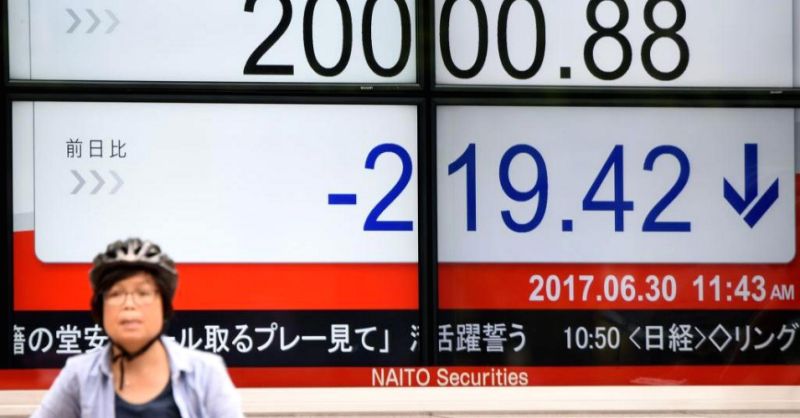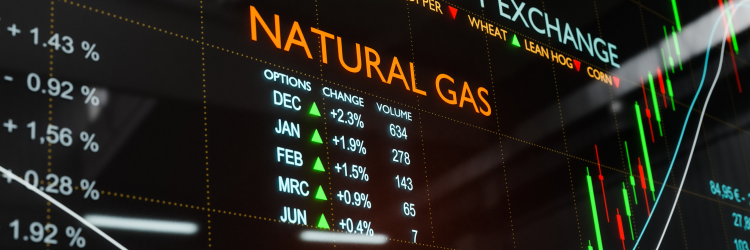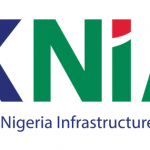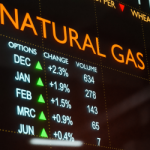Economy
Asian Equities Decline as Trump, Kim Leave Vietnam With No Deal

By Investors Hub
Asian stocks ended Thursday’s session mostly lower as comments by U.S. Trade Representative Robert Lighthizer dampened recent optimism about the U.S.-China trade talks.
Investor sentiment was also dented by weak data from China and news that U.S. President Donald Trump and North Korean leader Kim Jong Un abruptly ended summit talks earlier than scheduled.
Chinese shares fell as weak data reinforced fears that the world’s second-largest economy is losing momentum.
The benchmark Shanghai Composite Index dropped 12.87 points or 0.4 percent to 2,940.95, while Hong Kong’s Hang Seng Index fell 124.26 points or 0.4 percent to 28,633.18.
Activity in China’s vast manufacturing sector continued to contract in February, and at a faster rate, the latest survey from the National Bureau of Statistics revealed with a manufacturing PMI score of 49.2.
That missed expectations for a score of 49.5, which would have been unchanged from the previous month.
The non-manufacturing PMI came in with a score of 54.3 in February – shy of expectations for 54.5 and down from 54.7 in the previous month.
Japanese shares fell as hopes for progress in U.S-China trade talks faded and a historic summit ended without agreement on the denuclearization of the Korean Peninsula. Weak industrial output and retail sales data also weighed on markets.
The Nikkei 225 Index slid 171.35 points or 0.8 percent to 21,385.16, while the broader Topix closed 0.8 percent lower at 1,607.66.
Machinery and shipping stocks fell the most, with Fanuc, Mitsui OSK Lines and Komatsu falling 2-3 percent. Gaming firm Nexon Co. soared 4.7 percent on buzz that its holding firm NXC Corp. is up for grabs.
In economic news, industrial production in Japan plunged a seasonally adjusted 3.7 percent in January, a government report showed. That missed expectations for a decline of 2.5 percent following the 0.1 percent dip in December.
The total value of retail sales in Japan was down a seasonally adjusted 2.3 percent sequentially in the month, missing expectations for a decrease of 0.8 percent following the 0.9 percent increase in December.
Meanwhile, Australian markets eked out modest gains, with financials and healthcare companies leading the surge.
The benchmark S&P/ASX 200 Index rose 18.70 points or 0.3 percent to 6,169, taking the monthly gain to over 5 percent, its biggest monthly gain since July 2016. The broader All Ordinaries Index ended up 19.10 points or 0.3 percent at 6,252.70.
The big four banks rose between 0.4 percent and 1.3 percent in light of a less harsh outcome from a bank inquiry into financial misconduct. Healthcare stocks witnessed defensive buying, with CSL jumping 3.1 percent.
Ramsay Health Care surged up 5.9 percent as it reported a nearly 10 percent increase in first-half profits and reaffirmed its outlook for full-year earnings.
Mining stocks ended mixed after the release of weaker Chinese factory data. BHP fell 1.2 percent and Fortescue Metals Group tumbled 5.2 percent, while Rio Tinto rose over 1 percent.
On the data front, reports on private capital spending and private sector credit proved to be a mixed bag.
Seoul stocks closed sharply lower as the U.S.-North Korea summit ended abruptly with no deal. The benchmark Kospi plunged 39.35 points or 1.8 percent to 2,195.44 ahead of a long holiday weekend.
The local markets will be closed Friday to commemorate the March 1 Independence Movement, which took place in 1919.
Tech stocks succumbed to heavy selling pressure, with LG Electronics, Samsung Electronics and SK Hynix losing 2-5 percent.
Investors ignored positive industrial output data showing that production in South Korea climbed a seasonally adjusted 0.5 percent in January, rebounding from the 0.8 percent contraction in December.
Economy
Presco Acquires 10,000-Hectare Nsadop, Boki Plantations After $100m Deal

By Aduragbemi Omiyale
Days after announcing the injection of $100 million from SIAT NV, Presco Plc has acquired about 10,000 hectares across the Nsadop and Boki plantations in Cross River State.
The fully integrated edible oils group disclosed in a statement made available to Business Post on Friday that the strategic acquisition further consolidates its position as the dominant player in Nigeria’s palm oil industry.
The plantations is part of efforts to significantly expand Presco’s production footprint and strengthen its ability to meet the rapidly growing domestic demand for edible oil products.
By integrating these estates into the group, Presco will unlock new agronomic potential and secure a broader raw material base to support higher processing and refining throughput across its value chain.
By expanding its plantation base by 10,000 hectares, Presco advances national food security, reduces reliance on imports, and supports the federal government’s drive toward industrial self-sufficiency.
As these estates are upgraded and integrated, they are expected to generate meaningful productivity and profitability upside, delivering sustainable long-term value for shareholders while strengthening Presco’s role as a key driver of the country’s agro-industrial transformation.
Presco said it would apply its proven model of sustainable agriculture, community development, and responsible land stewardship to Nsadop and Boki.
The company plans to work closely with host communities, replicating its established social investment framework, supporting job creation, and ensuring a stable and mutually beneficial operating environment.
“This acquisition is a decisive execution of the commitments we made to our shareholders. During the launch of our recent Rights Issue, we pledged to accelerate our plantation expansion and position Presco for its next phase of growth.
“Today’s announcement delivers on that promise. Nsadop and Boki are strategically located estates that complement our existing operations and expand the scale required to power our mills and refineries at higher capacity,” the chief executive of Presco, Mr Reji George, said.
“This move is not only about expanding land, it is about strengthening our leadership, securing long-term supply, and reinforcing our belief in the future of Nigeria’s agribusiness sector,” he added.
Economy
FG Launches Platform to Settle Natural Gas Trade

By Adedapo Adesanya
The federal government has unveiled Africa’s first gas trading licence, clearing house and settlement leeway platform to ensure efficient and transparent trading of natural gas.
The government, through the Nigerian Midstream and Downstream Petroleum Regulatory Authority (NMDPRA) in partnership with the Securities and Exchange Commission (SEC) granted a license to JEX Markets Limited to establish and operate the online platform for gas trading and exchange.
Minister of State for Petroleum Resources (Gas), Mr Ekperikpe Ekpo, at the launch said the platform would pave the way for easy natural gas business, transparent pricing and secure payment mechanisms hallmarks that align with the national energy policies and global best practices.
According to him, the initiative is critical for the success of the ‘decade of gas’, noting that the trading environment and the benefits that come with it will strengthen the level of industrialisation and ensure the injection of private investments into the gas processing and transport sectors.
“This launch is completely consistent with the Renewed Hope Agenda of His Excellency, President Bola Ahmed Tinubu, who stated that natural gas will play the central role in the energy security, industrialisation, and economic diversification. The President’s vision requires a regulatory environment that is predictable, trusted, and designed to unlock value,” he said.
Mr Ekpo said the country is richly endowed with natural gas reserves, among the biggest in the world, but if the underlying market where the gas will flow is not efficient, reliable, and well-regulated, it will not be possible for us to realise the ultimate potential of the resource.
“The gas trading licence introduced today is decisive on this front, paving the way for a new, regulated market where reliable traders will feel safe doing business, where businesses can plan, and where investors can invest, knowing that it will safeguard both their capital and the public interest.
“The licence is founded upon sound regulations and guidelines governing technical competence, commercial capability, financial soundness, and responsible operations. Among the responsibilities of the licence holders is the adherence to the various rules on gas measurement, tariffs, pricing, and assignments,” he said.
On his part, NMDPRA Chief Executive, Mr Farouk Ahmed, also said Nigeria holds over 209 trillion cubic feet (TCF) of proven gas reserves, which is the largest in Africa and an estimated 600 TCF of potential reserves.
He said despite the potential, Nigeria’s domestic gas market has remained underdeveloped and constrained by pricing opacity, high transaction costs, limited flexibility, market illiquidity, poor sanctity of gas contracts, restricted access to gas and low investments in the sector.
Mr Ahmed noted that the presentation of a Gas Trading License (GTL) and a Clearing House and settlement Authorisation to JEX Markets Limited is in compliance with the provisions of section 159 of the Petroleum Industry Act (PIA) 2021 for the trading and settlement of wholesale gas in Nigeria.
The implementation and full operationalisation of this provision of the PIA will further unlock the extensive opportunity and investment potentials of the gas industry through the improved supply and utilisation of the country’s vast gas resource in our strategic economic sectors of power, Industry and transportation.”
Economy
PZ Cussons Stocks Soar After Cancelation of Exit from Nigeria, Others

By Adedapo Adesanya and Aduragbemi Omiyale
The shares of PZ Cussons appreciated by 9.36 per cent on the floor of the Nigerian Exchange (NGX) Limited on Thursday to N45.00 from N41.15 on Wednesday.
This was buoyed by news that the company has halted its Nigeria exit plans and unveiled fresh expansion targets driven by renewed growth momentum in its key markets of the country as well as others.
This followed the conclusion of a strategic review, outlining an ambitious plan to strengthen the company’s presence across key markets on the continent including Nigeria, Kenya, and Ghana.
The company in a statement on its website on Thursday noted that the renewed focus formed part of a broader strategy to build a portfolio balanced between Developed markets such as the United Kingdom and Australia/New Zealand, and emerging markets including Indonesia and Nigeria.
The review, which began in April 2024, had included the sale of the Group’s 50 per cent stake in PZ Wilmar Ltd., its non-core edible oils joint venture in Nigeria to its partner, Wilmar International, for $70 million.
According to the company, the review attracted substantial interest from potential buyers.
However, the Board resolved that shareholder value would be better maximised by retaining the Africa business and pursuing long-term growth.
PZ Cussons stated that its new strategic direction for Africa would focus on building a winning portfolio of “locally loved brands,” anchored on three major pillars.
The first pillar was core growth across Nigeria, Kenya, and Ghana.
This will involve plans to deepen brand-building efforts, expand distribution, improve in-store execution, strengthen revenue-growth management, and enhance digital engagement.
The firm noted that its Nigerian subsidiary had doubled the number of directly served retail outlets since the 2022 financial year, boosting recent performance.
The second pillar targets category expansion into adjacencies such as men’s grooming and beauty, leveraging established brands including Venus, Imperial Leather and Premier.
The third pillar focuses on pan-African expansion, with new markets expected to be supplied through its existing operations in Nigeria and Kenya.
Highlighting Africa’s long-term potential, the Group said the continent’s population was projected to grow by more than 900 million over the next 25 years.
This represented over half of global population growth. Nigeria alone is expected to add over 100 million people, supported by rapid urbanisation and an expanding middle class.
PZ Cussons added that recent economic and currency improvements had supported double-digit revenue growth in the first half of its financial year.
The board expressed confidence in the company’s prospects, citing deep local insights, decades of brand heritage and strong manufacturing and distribution capabilities, especially as several multinationals had exited the market in recent years.
It noted that nearly 80 per cent of revenue in Nigeria was generated from brands that hold the number-one or number-two position in their categories.
“In the 2025 financial year, Africa contributed £141 million in revenue and £16 million in adjusted operating profit, representing 27 per cent and 30 per cent of the Group’s totals respectively.
“Following the divestment from PZ Wilmar, its Africa operations now comprise Family Care and Electricals in Nigeria, and Family Care businesses in Ghana and Kenya.
“The Group holds a 73.3 per cent stake in PZ Cussons Nigeria Plc,” the statement said.
Commenting, Mr Jonathan Myers, Chief Executive Officer of PZ Cussons, said, “Since embarking on the strategic review of Africa, we have identified or agreed the sale of non-core or surplus assets totalling over £70 million.
“This, combined with continued cash generation of the Group, has significantly strengthened our balance sheet.
“After a thorough review of the remainder of the Africa business and careful evaluation of the offers received, the Board believes it is in the best interest of our stakeholders to retain the business.
“Africa is a market of great opportunity. Given PZ Cussons’ deep heritage there, and given the strength of our brands and operational capabilities, we are well-placed to win over the longer term.
“Benefitting from a more stable economic environment in recent months and with positive fiscal reform, momentum in our Africa business is strong, with double-digit revenue growth in the first half of the financial year.
“We will now look to build on this strong performance and extend our category leadership, with nearly 80 per cent of our revenue in Nigeria already coming from brands with #1 or #2 positions.
“With plans underpinned by appropriate guardrails established to reduce risk and manage volatility, we are confident that we have a business that is set up for success.
“We expect Africa to be a significant contributor to overall Group revenue growth as we seek to build a winning portfolio of locally-loved brands, balanced between Developed and Emerging markets.”
-

 Feature/OPED6 years ago
Feature/OPED6 years agoDavos was Different this year
-
Travel/Tourism9 years ago
Lagos Seals Western Lodge Hotel In Ikorodu
-

 Showbiz3 years ago
Showbiz3 years agoEstranged Lover Releases Videos of Empress Njamah Bathing
-

 Banking7 years ago
Banking7 years agoSort Codes of GTBank Branches in Nigeria
-

 Economy3 years ago
Economy3 years agoSubsidy Removal: CNG at N130 Per Litre Cheaper Than Petrol—IPMAN
-

 Banking3 years ago
Banking3 years agoFirst Bank Announces Planned Downtime
-

 Banking3 years ago
Banking3 years agoSort Codes of UBA Branches in Nigeria
-

 Sports3 years ago
Sports3 years agoHighest Paid Nigerian Footballer – How Much Do Nigerian Footballers Earn










